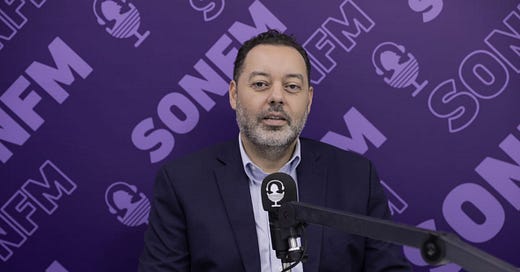Greetings from Tunis!
It’s been a busy month. I have a few longer blogs that I post soon (preview below) but I wanted to share some quick updates and some resources that I think will be helpful. I spent the last few days in Tunis. I’ll post the updates in reverse chronological order. Yesterday, I did an. interview (in Arabic) with Radio SonFM on a show cleverly called Sans Emissions (Without Emissions, but also a play on words to say Sound Show). The full show is available here. We discussed green colonialism in the Global South, the Mattei Plan, the Non-Aligned Movement and G77+China South Summit in Kampala, fossil fuel economic entrapment, the so-called green industrialization of Namibia (new blog on this coming up soon), and most importantly, I discussed what I call the Bargain of the Century for the Global South, which I will write about soon.
Strategic Repositioning the Global South
I gave two keynote speeches in Tunis this week. On Monday, I presented “Diplomacy for Economic & Geopolitical Transformation: A Strategic Repositioning of the Global South” at a closed-door event hosted by H.E. Ambassador Faisal Gouia at the newly established International Diplomatic Academy. The audience was none other than the 50 top recruits of the Tunisian Ministry of Foreign Affairs who came out of a very competitive selection and examination process that included close to 12,000 candidates.
I explained why the Global South must decolonize the global economic architecture and I presented the main arguments from the Just Transition report (available in English & French) that we publish last May (published by The Independent Group of Experts on Just Transition & Development), and most importantly I discussed the role of Global South diplomacy in crafting a major geopolitical bargaining chip in this particular moment of geopolitical repositioning. I will write about this in more detail soon, but if you can’t wait, you can listen to the main argument in this recent Macro N Cheese podcast I recorded with a few weeks ago.
And last but not least, I presented “The Colonial Roots of Climate Injustice in Africa: A United Front for Strategic Repositioning of the Global South,” at CEMAT, which was followed by a lively discussion moderated by my colleague Max Ajl. However, the main reason for the entire visit to Tunis this week was to record an interview for Habib Ayeb’s upcoming documentary about climate change titled Waiting for the Rain, which we did on Saturday afternoon at the CMAT library. I can’t wait to see the full documentary, but I must also urge all of you to watch his brilliant documentary on food sovereignty: Seeds of Dignity (subtitled in English).
I’m off to Cairo, then Nairobi. I’ll write again soon!
Stay radical, my friends!
Fadhel Kaboub is an associate professor of economics at Denison University (on leave), and the president of the Global Institute for Sustainable Prosperity. He is also a member of the Independent Expert Group on Just Transition and Development, and serves as senior advisor with Power Shift Africa. He has recently served as Under-Secretary-General for Financing for Development at the Organisation of Southern Cooperation in Addis Ababa, Ethiopia. Dr. Kaboub is an expert on designing public policies to enhance monetary and economic sovereignty in the Global South, build resilience, and promote equitable and sustainable prosperity. His recent work focuses on Just Transition, Climate Finance, and transforming the global trade, finance, and investment architecture. His most recent co-authored publication is Just Transition: A Climate, Energy, and Development Vision for Africa (May 2023, published by the Independent Expert Group on Just Transition & Development). He has held a number of research affiliations with the Levy Economics Institute (NY), the John F. Kennedy School of Government at Harvard University (MA), the Economic Research Forum (Cairo), Power Shift Africa (Nairobi), and the Center for Strategic Studies on the Maghreb (Tunis). He is currently based in Nairobi, Kenya and is working on climate finance and development policies in Africa. You can follow him on Twitter @FadhelKaboub and you can read his Global South Perspectives on substack where he blogs regularly.









Thanks so much. 🙏🏼🙏🏼🙏🏼👏🏼👏🏼
right now, what is the biggest barrier to Uniting the African Continent as one economic power? colonization? religion? no investment? government instability? Okay, maybe ALL are responsible, so biggest solution?